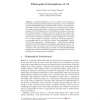Free Online Productivity Tools
i2Speak
i2Symbol
i2OCR
iTex2Img
iWeb2Print
iWeb2Shot
i2Type
iPdf2Split
iPdf2Merge
i2Bopomofo
i2Arabic
i2Style
i2Image
i2PDF
iLatex2Rtf
Sci2ools
209
click to vote
AI50
2006
2006
Philosophical Foundations of AI
Artificial Intelligence was born in 1956 as the off-spring of the newly-created cognitivist paradigm of cognition. As such, it inherited a strong philosophical legacy of functionalism, dualism, and positivism. This legacy found its strongest statement some 20 years later in the physical symbol systems hypothesis, a conjecture that deeply influenced the evolution of AI in subsequent years. Recent history has seen a swing away from the functionalism of classical AI toward an alternative position that re-asserts the primacy of embodiment, development, interaction, and, more recently, emotion in cognitive systems, focussing now more than ever on enactive models of cognition. Arguably, this swing represents a true paradigm shift in our thinking. However, the philosophical foundations of these approaches -- phenomenology -- entail some far-reaching ontological and epistemological commitments regarding the nature of a cognitive system, its reality, and the role of its interaction with its env...
AI50 2006 | Artificial Intelligence | Cognitive System | Paradigm Shift | Strong Philosophical Legacy |
Related Content
| Added | 20 Aug 2010 |
| Updated | 20 Aug 2010 |
| Type | Conference |
| Year | 2006 |
| Where | AI50 |
| Authors | David Vernon, Dermot Furlong |
Comments (0)

